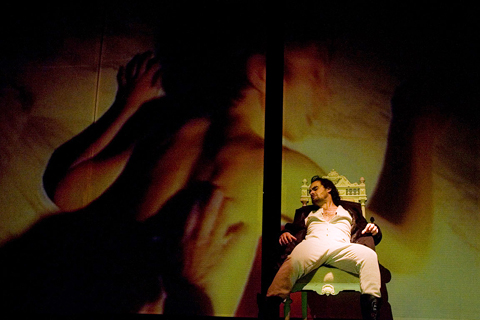The Taipei Arts International Association (TAIA) has come up with an original bill of fare for its 2008 World Drama Series, with three plays that blur the lines between history and reality, and actors and the audience. The series is titled The Fiction of Lives, which is appropriate considering we live in a world where fiction is paraded as fact by politicians, talent-less heiress make millions while gifted artists are ignored, and people commit crimes just to be able to send a clip to their friends’ cellphones or post them on Youtube.
First up, beginning tonight, is an innovative troupe from Belgium, Needcompany, and their 2004 production, Isabella’s Room, which TAIA has labeled a White Story.
Isabella’s Room was the first part of director and company co-founder Jan Lauwers’ trilogy about human nature called Sad Face/Happy Face. The inspiration for the work came from the ethnological/anthropological collection Lauwer’s father left him after his death.

PHOTO: COURTESY OF TAIA
The nine actors explore key events of the 20th century (the end of colonialism, World War II, Hiroshima, modern Africa) as they tell the story of a character called Isabella Morandi, who was born at the beginning of the 20th century, through the objects in her room. The play mixes text, dance and songs.
The second part of the Sad Face/Happy Face trilogy was The Lobster Shop, created in 2006, and the third installment, The Deer House, premieres this summer. Let’s hope that Taipei audiences will one day get the chance to see these as well.
Next month brings a bit of cross-strait cultural exchange as the Shanghai Dramatic Art Center (上海話劇藝術中心) troupe opens at the National Theater on June 5 with their three-year old production, The Scholar and the Executioner (秀才與劊子手).

PHOTO: COURTESY OF TAIA
This contemporary black comedy examines the changing society of the late Qing Dynasty through the fates of two men, a scholar named Xu, who keeps failing the imperial examinations, and an accomplished government executioner named Ma, who has developed several techniques for beheading his prisoners. The two men find themselves confronting the same dilemma, obsolescence, after the government does away with the examination system and the death penalty.
All the characters in the play, with the exception of Xu, Ma and Xu’s wife, wear masks, giving them the look of human puppets, presumably a metaphor for the lives of Xu and Ma, who are caught up by forces beyond their control. In the end the men discover that even though they come from very different worlds, they must overcome their fears if they are to survive.
The play won several awards in China for author Huang Weiruo (黃維若), a professor at the Central Theater Academy.
TAIA’s drama festival concludes in July with the globetrotting Spanish troupe La Fura dels Baus, which turns 30 next year.
The Barcelona-based troupe has become know for its unusual settings, urban themes, willingness to cross between audience and actors, and use of mixed media. It was supposed to make its Taipei debut last year but had to cancel after one of the actors fell ill. However, they did make an appearance in Kaohsiung in December for a New Year’s Eve festival.
With its most recent work, Boris Godunuv, La Fura dels Baus takes the 1825 play by Alexander Pushkin and gives it a contemporary twist by setting it in the Moscow theater that was seized by armed Chechen militants on Oct. 23, 2002 during a performance of the play Nord-Ost. More than 800 people were taken hostage and the militants demanded Russia pull its forces out of Chechnya. Russian Special Forces stormed the theater on Oct. 26, and the official death toll from the four-day drama was at least 33 terrorists and 129 hostages killed.
Playwright/director David Plana’s aim with Boris Godunuv was to put the audience in the center of the action as he examines the grip the fear of terrorism has on modern societies. La Fura dels Baus has gained fame for its willingness to tackle the unconventional and its latest offering appears to be living up to that reputation.

April 28 to May 4 During the Japanese colonial era, a city’s “first” high school typically served Japanese students, while Taiwanese attended the “second” high school. Only in Taichung was this reversed. That’s because when Taichung First High School opened its doors on May 1, 1915 to serve Taiwanese students who were previously barred from secondary education, it was the only high school in town. Former principal Hideo Azukisawa threatened to quit when the government in 1922 attempted to transfer the “first” designation to a new local high school for Japanese students, leading to this unusual situation. Prior to the Taichung First

The Ministry of Education last month proposed a nationwide ban on mobile devices in schools, aiming to curb concerns over student phone addiction. Under the revised regulation, which will take effect in August, teachers and schools will be required to collect mobile devices — including phones, laptops and wearables devices — for safekeeping during school hours, unless they are being used for educational purposes. For Chang Fong-ching (張鳳琴), the ban will have a positive impact. “It’s a good move,” says the professor in the department of

On April 17, Chinese Nationalist Party (KMT) Chairman Eric Chu (朱立倫) launched a bold campaign to revive and revitalize the KMT base by calling for an impromptu rally at the Taipei prosecutor’s offices to protest recent arrests of KMT recall campaigners over allegations of forgery and fraud involving signatures of dead voters. The protest had no time to apply for permits and was illegal, but that played into the sense of opposition grievance at alleged weaponization of the judiciary by the Democratic Progressive Party (DPP) to “annihilate” the opposition parties. Blamed for faltering recall campaigns and faced with a KMT chair

Article 2 of the Additional Articles of the Constitution of the Republic of China (中華民國憲法增修條文) stipulates that upon a vote of no confidence in the premier, the president can dissolve the legislature within 10 days. If the legislature is dissolved, a new legislative election must be held within 60 days, and the legislators’ terms will then be reckoned from that election. Two weeks ago Taipei Mayor Chiang Wan-an (蔣萬安) of the Chinese Nationalist Party (KMT) proposed that the legislature hold a vote of no confidence in the premier and dare the president to dissolve the legislature. The legislature is currently controlled